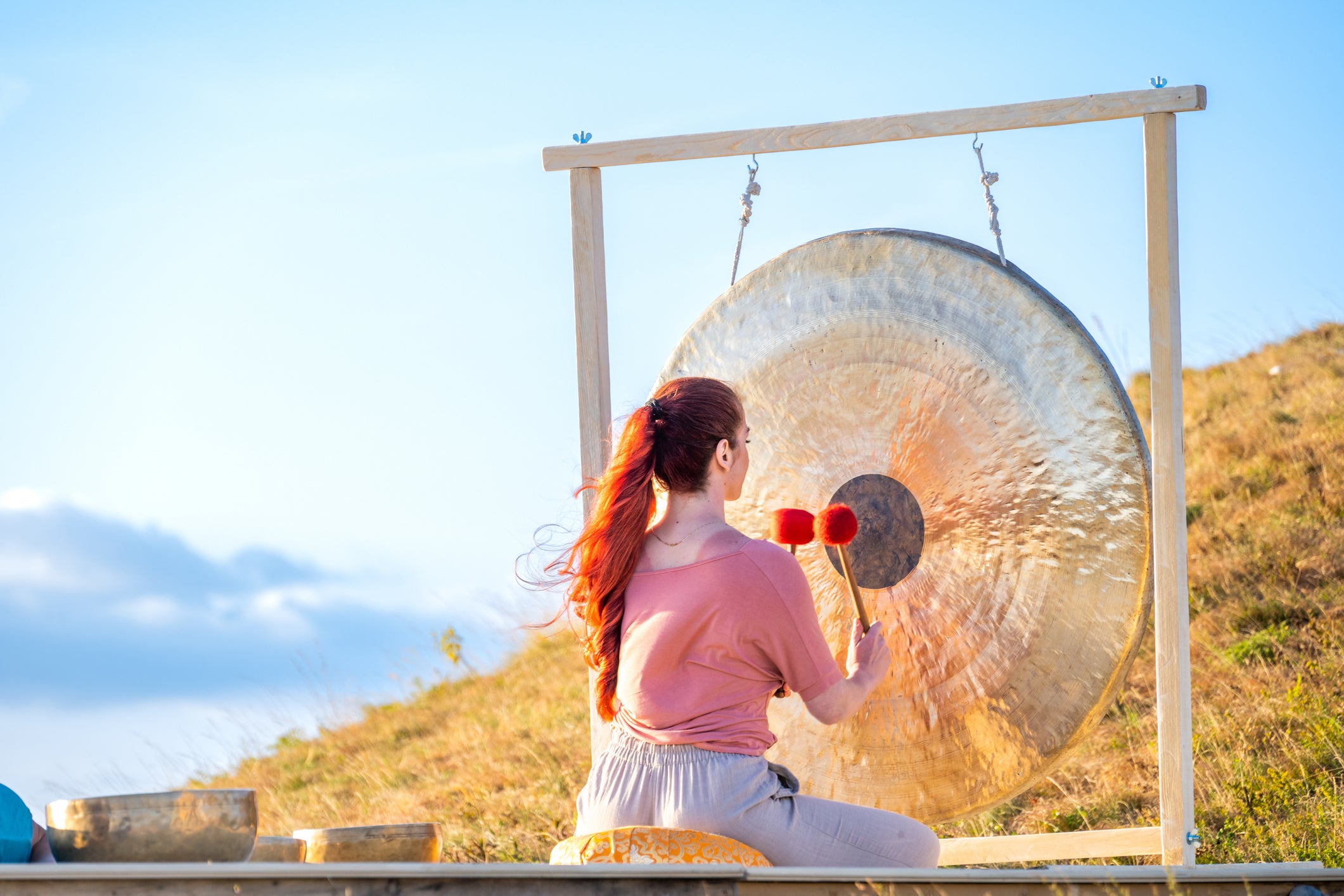Can a predilection for the ultra-spiritual or the woo-woo really ruin your relationship? Recent reports allege that this is what it did in the marriage of Manchester United centre-back Matthijs de Ligt, who is divorcing his wife AnneKee Molenaar after only a year of marriage. The Dutch outlet DenD has claimed that Molenaar’s penchant for posting “exaggerated spiri-wiri content” on her Instagram – along with her thoughts on gemstones, crystals and herbal remedies – drove him away.
Molenaar’s story resonated with me on different levels – I’ve also gone head first into new-age spirituality, and it’s come at the cost of my relationships. More than 20 years ago, I swapped substances for self-help books when I first entered recovery for alcoholism. It was hardly surprising. I needed to fill a huge gap in my life and learn to believe in something greater than myself. It alienated my old friends, who quickly got sick of me talking about Deepak Chopra’s views on the soul’s journey, but I soon balanced out. Many years later, though, new-age spirituality began to impact my romantic life.
It started when I began meditating and visualising my perfect life – which meant holding a vivid snapshot of it in my mind so that it would somehow become imprinted on me. I had to keep my positive vibrations high by maintaining a state of joy, gratitude and expectancy, all in order to trick my brain into thinking I had already achieved my goal. All of this was based on the “law of attraction”, a concept brought to global attention by the self-help book The Secret, and, which claims that one’s thoughts and feelings can directly influence external reality.
In practice, I ended up living in a bubble and losing connectedness, as it’s called in woo-woo land, to my then partner. I remember one particular holiday in Greece. I was trying to get pregnant, so I spent most of the trip working on manifesting grade-A embryos for our next session of IVF. I look back and regret not living in the present with him – this turned out to be our last holiday before he died. But at the time, I felt like I had to do what I had to do.
I often felt like unless my partner joined me on the same spiritual page, we would be living two different lives – his was earthbound, while mine was largely in my mind. Instead of appreciating the life I had, I was busy imagining holding a newborn baby. It led to a disconnect from the real world, and a disconnect from my relationship.

I was in a perpetual state of what is termed “toxic positivity”, in which I’d constantly seek positive emotions while suppressing negative ones. I had to feel gratitude to help attract what I wanted, despite the cold truth that the reality of infertility was agonising. I’m not writing off manifestation – it definitely can help – but for me, I took it too far. I was convinced that if I tried really hard to stay positive, I could magic a baby. I was – to put it plainly – obsessed.
The idea of a “divine plan” – as if everything that happens is meant to be, therefore you must be tolerant and patient – is fine to believe. But go too far and use spiritual beliefs to help you avoid dealing with pain and trauma and it becomes unhealthy. They call it “spiritual bypassing”. At one point in my life, I couldn’t make any decisions without consulting my psychic medium. I was dependent on her, and at times I felt far closer to her than my then partner. That’s because it was my medium who was telling me how he was feeling and thinking, rather than him.
Women are much more likely than men to seek to feel good through new age spiritual practices, like aura healing, moon bathing, breathwork retreats, gong baths, psychic mediums, and witchy-woo spells. A third of women describe themselves as spiritual, compared with a fifth of men, according to a YouGov UK Survey conducted in 2021 – with 27 per cent of women believing that crystals have healing properties, compared to 11 per cent of men. And while only 9 per cent of men agree that star signs have a genuine impact on a person’s character and their compatibility with other people, one in five women (22 per cent) say this is probably or definitely true. Likewise, 57 per cent of women believe in people emitting positive or negative energies and vibrations, compared to 35 per cent of men.
“Wellness practices can support relationships but only when they deepen self-awareness and relational capacity,” says Elizabeth Earnshaw, a relationship expert and author of 2022’s I Want This To Work: An Inclusive Guide to Navigating the Most Difficult Relationship Issues We Face in the Modern Age and this year’s Til Stress Do Us Part: How to Heal the #1 Issue in Our Relationships. “This is not the case when [spiritual practices] become performative, or another form of avoidance. It can become ‘emotional bypassing’ dressed up in psychological or spiritual language. Or a defence for poor behaviour, such as being unreliable because of ‘boundaries’, or telling the other person what is wrong with them all of the time because of some spiritual or psychological superiority.”
Real intimacy requires the ability to talk about what is, Earnshaw says, not just what should be. “If a partner uses relentless positivity or spiritual rhetoric to shut down hard conversations, it creates distance, not connection,” she explains. However, it can be equally harmful to dismiss a partner’s genuine beliefs as “toxic positivity”. Just because someone likes to focus on gratitude or hope or faith of some sort, doesn’t mean they are necessarily wrong. “It might really be what they believe and what is helpful to them,” she continues. “The goal shouldn’t be to eliminate all positivity, or all negativity. Rather it’s to stop being dismissive of others’ points of view or ways of managing life.”
Amanda White, LPC therapist and founder of America’s Therapy for Women Center, says that the craze for posting spiritual content on social media often emphasises individual optimisation over community and relationships. She also believes it can lead people away from genuine connection rather than toward it. “Self-help and wellness content is an extremely popular topic online because so many people are struggling,” she says. “I think a lot of times what drives people to do this is trying to make money as an influencer or at the very least get positive reinforcement and attention.” Whether it’s posting “five things you need to do to manifest the life of your dreams”, she says, or demonstrating meditating, manifesting, praying, and doing tarot readings, these routines give people some semblance of control over their lives. “But a lot of what influencers share online is not real,” she continues. “Consumers forget this and truly believe, for example, they need a 10-step morning and evening routine.” When someone becomes overly focused on perfecting such routines, they might actually spend less quality time with the people they love. “It can become a socially acceptable way to withdraw from relationships while feeling like you’re doing something positive.”

Padma Coram, a spiritualist and integrative lifestyle and wellness expert at London’s Hale Clinic, who helps clients to align their spiritual practices with real-life wellbeing, says spirituality is often used for escapism. “People spend huge amounts of money on treatments thinking it’s the ‘cure-all’,” she says. “When you come to ‘spirituality’ from a place of desperation, it can become an addiction because it’s about filling a hole in the soul. They never reach peace.”
It’s particularly concerning, she says, when clients have wanted to manifest their dream life – and get into extreme debt. “They try to match their vibration with the life they want to lead, believing the laws of attraction mean they need to ‘fake it to make it.’” They end up living beyond their means – which can create a huge financial strain in a relationship. “People take it too literally – and stop living in reality.”
The truth is that while many of us want to turn our dream life into an abundant reality through woo-woo activities – and embody the goddess or warrior within – it’s not always the best course of action. As White says, spiritual content online can make avoidance look like growth, and it can harm relationships.

“Instead of having difficult but necessary conversations, people are told to ‘protect their peace’. Instead of processing challenging emotions with support, they’re encouraged to simply manifest better thoughts,” she says. “The message becomes that if you’re struggling, you just need to buy the right journal or find the right practice, rather than acknowledging that real growth often happens in relationships with others and is messy.”




